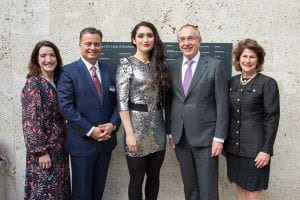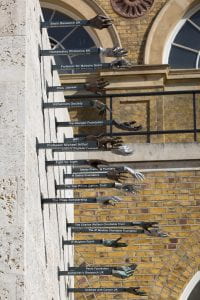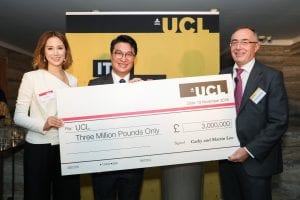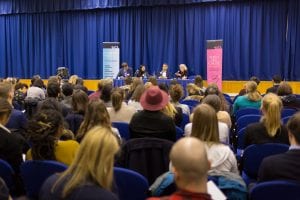Giving a big hand to UCL’s donors – UCL’s new Donor Wall is unveiled
By ucypnmb, on 23 May 2019
Next time you walk through the Wilkins Terrace, look out for a striking new piece of public art literally reaching out to you. The installation, featuring over 60 hands individually cast in bronze and aluminium, is UCL’s new Donor Wall – a high-profile celebration of the enormous role that philanthropy plays in supporting our community and delivering our long-term ambitions.
The hands belong to members of UCL’s Circle of Benefactors, a diverse group of our most generous donors who give to us at the £1m+ level, plus other leading supporters of UCL. They include TV presenter Nick Ross representing the Jill Dando Fund, AI pioneer Demis Hassabis representing DeepMind, Founder and Executive Chairman of Iceland Food Sir Malcolm Walker, Hong Kong-based alumna Cathy Lee, and alumni Christopher Nolan and Emma Thomas – plus many more individuals, companies, organisations, charities, trusts and foundations from around the world.
The Wall was created by Slade School alumna Dr Sarah Fortais and you can find out more about her concept in this video.
We officially unveiled the Donor Wall last week at a wonderfully celebratory event to demonstrate to our largest donors how much their investment and partnership matters to UCL.

Unveiling the Donor Wall: (l to r) Angharad Milenkovic, Director of Development; alumnus and donor George Farha; artist Sarah Fortais; President & Provost Michael Arthur; Vice-Provost (International) Nicola Brewer
Guests included UCL alumnus George Farha, whose name will be familiar to all of us thanks to his outstanding and very diverse support of UCL, which ranges from funding the George Farha Café to supporting scholarships and posts in areas including women’s health, social justice and the built environment.
Recalling his student days, he commented that UCL is “a lot bigger and quite a bit shinier” than in his day, adding that “the thing that has remained the same is UCL’s commitment to its radical roots.”
The event was also an opportunity to update guests on the progress of the It’s All Academic Campaign, to which they have contributed significantly. The Campaign total now stands at £525 million and is set to reach its target of £600 million in 2020 – one year ahead of schedule.
These huge sums of money are hard to visualise but what we can see very clearly is the tangible impact they are having. Thanks to philanthropy, hundreds of students have received life- changing opportunities through scholarships. A major new home for our neuroscience research bringing is rising up on Grays Inn Road, bringing UCL’s Queen Square Institute of Neurology and the hub of the UK Dementia Research Institute together under one roof.

Nick Ross marks the Donor Wall unveiling on behalf of the Jill Dando Fund, which supports the UCL Jill Dando Institute
Generous donations have catalysed the creation of institutes and research programmes which harness UCL’s multidisciplinary excellence to lead the way in artificial intelligence, mental health, mission-oriented economics, early years education, and much more.
The success of the Campaign, and the breadth and diversity of Circle of Benefactors members, is a great tribute to Lori Houlihan, Vice-Provost (Advancement). Under her leadership, UCL has grown to become one of the UK’s highest performing fundraising universities and this Campaign has broadened and globalised our supporter base significantly.
Unfortunately, due to ill health, Lori couldn’t be at last Thursday’s event to see the fruits of her astute and creative leadership. I was privileged to step in on her behalf. While she is recovering, she has asked me to look after OVPA and I am happy to be working with her brilliant team in the interim.
I know that Lori would want me to thank the whole UCL community, whose support has been vital to making the Campaign the great success it is. The Donor Wall provides a highly visible testament to how far UCL has come in establishing fundraising as a university-wide endeavour and a crucial enabler of our academic mission.
 Close
Close
















 We are now just over two years since the public launch of the
We are now just over two years since the public launch of the 

